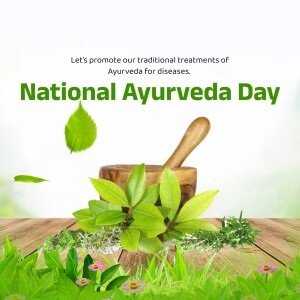
Vaidehi Bhargava
National Ayurveda Day, celebrated annually on Dhanvantari Jayanti (Dhanteras), symbolizes India’s ancient wisdom and the holistic science of life. This auspicious occasion, which typically falls two days before Diwali, honors Lord Dhanvantari, revered as the divine healer and the God of Ayurveda. His blessings are sought for health, wellness, and vitality, making this celebration a significant marker of India’s health philosophy.
Ayurveda, a Sanskrit term meaning “science of life,” has a history dating back over 5,000 years. It forms a cornerstone of India’s cultural and medicinal heritage. The practice goes beyond mere treatments; it encompasses a holistic way of living, emphasizing balance between mind, body, and spirit. In the ancient scriptures like the Atharvaveda and Charaka Samhita, Ayurveda is heralded as the key to long life and well-being, prescribing individualized regimens that consider one’s unique constitution, known as Prakriti.
National Ayurveda Day was first celebrated in 2016 by the Government of India, aiming to popularize and bring the significance of this ancient medical science to modern consciousness. This day serves not only as a tribute to the ancient Indian system of medicine but also highlights its growing relevance in contemporary healthcare. With the rising awareness of holistic health and natural remedies, Ayurveda has been embraced globally, with its principles integrated into wellness programs, yoga practices, and dietary routines worldwide.
The cultural aspect of National Ayurveda Day is deeply intertwined with India’s identity. In many households, traditional practices rooted in Ayurveda still hold sway. Simple customs like using turmeric in food for its anti-inflammatory properties, consuming Chyawanprash during winters to boost immunity, or applying bhringraj oil for healthy hair all reflect this ancient wisdom. The day is also marked by seminars, workshops, and health camps that promote Ayurvedic treatments for modern-day ailments like stress, lifestyle disorders, and chronic diseases.
One of the key facets of Ayurveda is the concept of the three doshas—Vata, Pitta, and Kapha. These elemental forces govern our bodily functions and mind. Ayurveda believes that the imbalance of these doshas is the root cause of disease, and restoration of harmony is the key to health. Remedies in Ayurveda are largely derived from nature—herbs, oils, minerals, and various formulations crafted through centuries of knowledge passed down from sage to sage.
On this day, practitioners and students of Ayurveda come together to reflect upon its timeless teachings. Rituals and offerings are made to Lord Dhanvantari, who is believed to have emerged during the Samudra Manthan (churning of the ocean) carrying the Amrita, the nectar of immortality. His image, holding a pot of elixir, remains a symbol of healing and life itself.
Thus, National Ayurveda Day is not just a commemoration but a revival—a reconnection to the rhythms of nature, a reaffirmation of the philosophy that health is wealth, and a deep bow to the age-old wisdom that continues to heal, restore, and rejuvenate the world.

